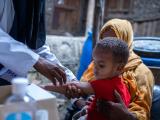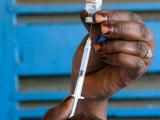May 14, 2003 (CIDRAP News) – Federal health officials say businesses and universities should go ahead with meetings and events, such as graduation ceremonies, that include travelers from areas affected by SARS (severe acute respiratory syndrome).
The Centers for Disease Control and Prevention (CDC) made the recommendation today in new guidelines designed to help organizations that have employees from affected countries or that expect to host visitors from affected countries.
In addition to the advisory not to cancel meetings, the CDC does not recommend quarantining people arriving from SARS-affected areas if they have no fever or respiratory symptoms, officials said in a news release. But such people should receive yellow health alert notices about the importance of monitoring their health for 10 days following travel, the agency said. Those who experience fever, cough, or breathing difficulty should seek medical attention immediately.
"With appropriate public health measures, we can continue the kind of openness that characterizes our society despite this outbreak," said CDC Director Julie Gerberding in the news release. "The guidance we are releasing today provides institutions and organizations a sound and consistent approach to SARS prevention without stigmatizing individuals arriving in the United States from countries affected by SARS."
The CDC says that if a visitor from an area with SARS experiences a fever or respiratory symptoms while in the United States, three steps are recommended:
- Exclude the person from activities and put him or her in a separate area to minimize contact with others while awaiting medical intervention.
- Alert healthcare workers that a person from a SARS-affected area needs evaluation, so that the workers can prepare to use infection control measures during transport and in the healthcare setting.
- Remind the healthcare provider to notify the appropriate state or local health officials if SARS is suspected.
The CDC also has outlined other actions organizations can take to be prepared. These include sending information about SARS to meeting participants in advance, notifying participants that those who have suggestive symptoms or recent exposure to SARS patients should not travel, and giving participants tools to monitor their health, such as a thermometer.
See also:
CDC's "Interim Guidelines for Businesses and Other Organizations with Employees Returning from Areas with SARS"
http://www.foh.dhhs.gov/NYCU/SARS/Sarsguidelines5_14a.pdf
CDC's "Interim Guidance for Institutions or Organizations Hosting Persons Coming to the United States from Areas with Severe Acute Respiratory Syndrome (SARS)"
http://www.foh.dhhs.gov/NYCU/SARS/Sarsguidelines5_14b.pdf


















